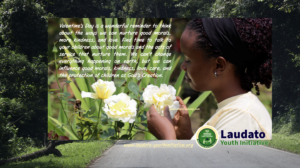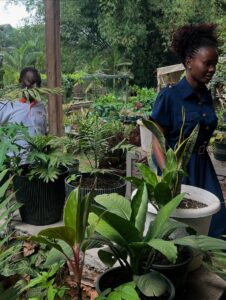By Laudato Voices | September 27, 2025.
In a bold and visionary step towards environmental stewardship and public health, Uganda has officially announced the launch of National Cleaning Days, to be observed every last Saturday of the month. In a letter from the permanent Secretary Ben Kumumanya instructs recipients to urgently commence the implementation of the directive. This initiative, is a big hope for young people as it spearheads our growing concern and the recently concluded 10th anniversary of Laudato Si’ Partners encounter in Kampala who discussed and We thank God for the gift of the life and ministry of Pope Francis. His vision, leadership and the legacy of care for creation through his Encyclical, Laudato Si’ changed perspectives on ecology and motivated new initiatives in the entire world, the gathering that formed, a Consortium, comprising of 17 organizations Laudato Youth Initiative included.
The Kampala Archdiocese Pastoral Coordinator, Fr. Ambrose Bwangatto, grounding us in faith, purpose, and unity said for a start, we are taking note of the urgent appeal that Uganda cannot continue to be defined by its dependence on ever increasing plastic use. The time for change is now, each one of us must champion sustainable practices, from saying no to disposable plastic bottles to holding our institutions accountable. And as a network, we have demonstrated today and we will continue to do so, that a plastic free Uganda is possible. We have resolved that in all our meetings and gatherings; we shall carry our own water dispensers and water bottles to limit on littering. A message that was emphasized by Archbishop of Kampala, Paul Ssemogerere saying;
This is not the first time the Catholic Church in Uganda has taken a stand against plastic waste. In previous years, the Uganda Episcopal Conference issued strict guidelines discouraging the use of plastic bottles and disposable packaging during major religious events, most notably at the annual Uganda Martyrs Day pilgrimage; the single largest Christian gathering in the country, which draws thousands of the Christian faithful from across East Africa and beyond. The time is now to join hands with the civil society and for us focusing on institutions must know that this announcement is more than ceremonial. It is a tangible expression of hope, a call to action, and a collective commitment to improving the quality of life, health, wellness, and productivity of all Ugandans and so in the world of Laudato Youth its time for a renewed call to “Unite for Climate Action”.
Faith in Action: A Church-led Commitment to Ecological Renewal
During the Laudato Si’ commemorations, Catholic institutions and faith-based organizations across Uganda made a bold declaration: a united pledge to eliminate single-use plastics from all their spaces, services, and gatherings (Vatican News, 2025). This move aligns spiritual responsibility with practical action and amplifies the Church’s call for ecological conversion. Across the country, churches, schools, and other institutions are replacing disposable plastics with sustainable alternatives, promoting the use of reusable containers, local biodegradable materials, and segregated waste collection. An effort we have taken seriously.
♻️ Our Laudato Si’ Clubs in Institutions Leading the Way
Our Laudato Si’ Clubs, active in schools, parishes, universities and communities, are at the forefront of this green revolution. Their regenerative environmental projects from plastic collection and upcycling to tree planting, composting, and climate education, are empowering young people to become faithful stewards of creation. These efforts remind us that caring for the environment is not separate from caring for peace, health, and mental health. As Laudato Si’ teaches, “The cry of the earth and the cry of the poor” are deeply interconnected (Laudato Si’, 49).

Uganda’s Shift on Plastics and Waste Management
Uganda has long struggled with plastic pollution. A ban on single-use plastic carrier bags was first enacted in 2007, strengthened in 2010 and 2019, but its implementation faced challenges due to weak enforcement and economic pressures (Down To Earth, 2024).
Today, the tide is turning. In 2025, the National Environment Management Authority (NEMA) renewed its commitment to enforcing the ban on all single-use plastics, launching pilot projects in Kampala, Mbale, and Gulu to develop localized waste solutions (New Vision, 2025).
Uganda generates around 600 metric tonnes of plastic waste daily, much of which clogs waterways, litters landscapes, and infiltrates food systems—posing serious threats to biodiversity, farming, water access, and public health (Down To Earth, 2024). By pairing strong policy with grassroots action, Uganda can now lead the region in turning the tide on plastic pollution.
Why National Cleaning Days in Uganda Matter
The newly introduced National Cleaning Days are not merely acts of civic duty they are expressions of love for our country, and investment for the future generations, and encouraging all of us to take on our role of stewardship. Each month, Ugandans will come together to clean their communities, educate one another, and affirm their shared responsibility for creation I hope this is something your excited about as it has other benefits like building community and teaching young ones values.
These monthly activities if done well they will:
•Reduce urban and rural waste accumulation
•Promote better sanitation, hygiene, and safe water (WASH)
•Prevent disease outbreaks linked to unmanaged waste
• Encourage citizen responsibility and community solidarity
• Unite diverse faith communities in a shared act of care
Just as important, these clean-up days will also serve as platforms for environmental education, where youth, religious leaders, educators, and local officials can engage in climate dialogue, policy advocacy, and sustainable behavior change.
United for Climate Action is our motto answering the (MAST) Model
As we look ahead, we call on every Ugandan from bishops to students, from urban dwellers to rural communities to be part of this initiative.
We invite:
• Religious institutions to model ecological leadership through monthly clean-ups
• Our Laudato Si’ Clubs and schools to organize awareness campaigns and local actions
• Local governments and municipalities to provide logistical support and waste collection
• Community leaders and families to take personal ownership of their surroundings
Together, these collective actions will strengthen Uganda’s climate resilience, public health, and moral witness to future generations. This is a moment of hope and transformation. The introduction of National Cleaning Days, combined with the Church’s bold stand against plastic pollution, marks a turning point for Uganda. It reminds us that the environment is not a side issue it is central to peace, justice, health, and human dignity. As Psalm 24:1 proclaims: “The earth is the Lord’s, and everything in it.”
Let every last Saturday of the month be a holy and hopeful act of cleaning, restoring, educating, and rebuilding. Let us rise with our brooms, bins, voices, and values and help make Uganda a cleaner, healthier, and more hopeful home for all.
References
Down To Earth. (2024, June 19). Africa’s fight against plastic pollution gathers pace as Uganda bans single-use carrier bags. https://www.downtoearth.org.in/africa/africas-fight-against-plastic-pollution-gathers-pace-as-uganda-bans-single-use-carrier-bags
New Vision. (2025, May 6). Uganda to enforce ban on single-use plastics amid mounting waste. https://www.newvision.co.ug/category/agriculture/uganda-to-enforce-ban-single-use-plastics-ami-NV_210287
Vatican News. (2025, May 18). Uganda: Catholic institutions and faith-based organisations pledge to eliminate single-use plastics. https://www.vaticannews.va/en/africa/news/2025-05/uganda-catholic-institutions-and-faith-based-organisations-ple.html














